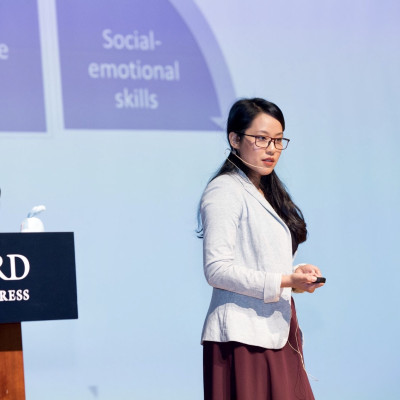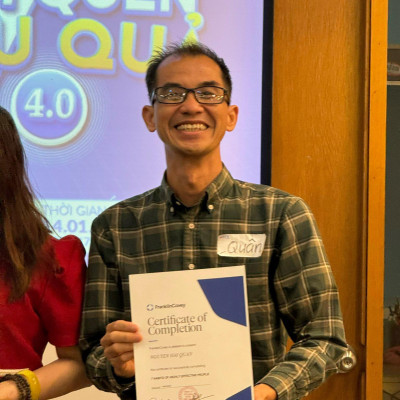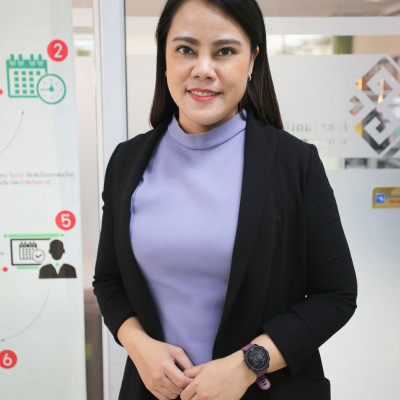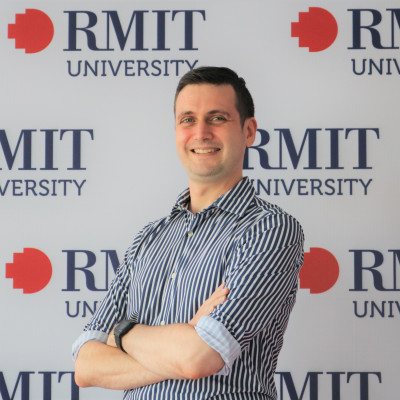Sessions / All Levels
ER 101: Starting Strong with Extensive Reading #4058
What is Extensive Reading, and how can we help students get started? What should they read, and how do we build and look after a library that will help them improve? How can we check if students are reading and making progress, without taking away the freedom that ER gives? This practical workshop gives an introduction to ER for teachers new to the approach. It also offers ideas for experienced practitioners who are looking for effective ways to introduce ER to their students, colleagues, or institutions. We will look at a range of rationales for ER including fluency development, vocabulary growth and affective benefits, and discuss how these can be communicated in different teaching contexts. The attendees will also share ideas about text selection, library development, assessment strategies, and the role of the teacher in an ER environment.
Writing Graded Readers #4035
This workshop will be a hands-on look at how graded readers are written and how ideas become books. Writing compelling graded readers requires more than just simplifying language—it involves thoughtful design, creative storytelling, and a deep understanding of learner needs. This interactive workshop will guide participants through the entire process of writing graded readers, from concept development to final draft. We will explore how to choose topics that engage learners, balance linguistic control with natural language, and build progression across levels. Participants will examine techniques for adapting existing texts and crafting original stories, incorporating CEFR-aligned vocabulary and grammar. Special attention will be given to voice, pacing and chapter structure among other elements. The session will also cover tools for planning, drafting, and editing. Whether you're new to writing or looking to refine your approach, this workshop offers practical strategies and inspiration to help you create effective, enjoyable graded readers.
ERWC7 Opening Ceremony #4476
ようこそ! Welcome to the Seventh World Congress on Extensive Reading.. In this brief opening ceremony, delegates will be treated to a traditional festival-like performance by the Hokusei Gakuen University Yosakoi Club. Please join us for this exciting start to our biggest ER World Congress yet!
Extensive Reading and Reading Fluency: Promises and Limitations #4452
A considerable body of empirical research supports the belief that extensive reading is an effective way for second language learners to develop greater reading fluency. However, recent research indicates that extensive reading alone is not the most effective way to promote greater fluency. In this presentation I first review theories of fluency development proposed by cognitive psychologists and synthesize the key ideas in those studies. This synthesis produces a short list of desirable characteristics of fluency-enhancing reading tasks. I then consider how well extensive reading and other types of reading activities have those desirable characteristics, in what ways these activities appear to be lacking, and how their potential weaknesses can be addressed. This analysis shows that although extensive reading is an indispensable part of a fluency-based reading course, fluency development can be enhanced by using supplementary reading tasks.
How to Train Young Brilliant Minds to be Culturally Aware Using Graded Readers #4055
Research has shown that children who are exposed to Extensive Reading from a young age not only excel in academic skills, but also develop empathy, moral judgement and become culturally sensitive. Equipping students to explore diverse perspectives has never been more crucial in this day and age. Bennett (1986) proposes six stages of acculturation that learners can move through to gain greater cultural awareness. With constant exposure, they develop their own personal ideas, ultimately assimilating the culture of others into their own worldview. In this presentation, we will explore theories of “Cultural Development” and the cultural trajectories in the students’ learning journey to assimilation using themes from Eli’s Real Lives Series Graded Readers as a stepping stone. At the end of the session, participants will have a better understanding of how to utilise Graded Readers for all CEFR levels.
Merging EL and ER into Extensive Viewing Videos with Captions #4057
This presentation will highlight how to create extensive reading content in video format that is free, fun, and effective. Teachers and materials writers can learn how to generate an endless supply of engaging media content that students can read through captions. The emergence of AI and various online tools, such as VEED.IO, has made it easy to provide captions for video and audio content. As a result, both the extensive listening and extensive reading movements are now merging with the development of extensive viewing. This presentation will demonstrate how teachers can create or find content for any level and how to add captions to videos to help students increase their reading time. Additionally, the presentation will explore the differences between reading blocks of text in paragraph format and reading captions on various devices, as well as how captions can serve as a bridge for developing a love for reading.
Xreading: What’s New and What’s Next #4032
Xreading is digital library that gives students access to over a thousand graded readers from major publishers such as Cambridge University Press, Macmillan, and National Geographic/Cengage Learning. Students have unlimited access to all books as well as audio narrations, ratings, and quizzes. In addition, the system tracks students' reading progress (books read, words read, reading speed, quiz scores, etc.) so it makes management and assessment much easier for teachers. Since it’s launch is 2014, the system has been continuously evolving and growing in terms of the number of books and features. In this presentation, the founder of Xreading will explain the new functionality that has been added over the past year, and what is planned for the future including our new textbook series and COIL project. Current users of the system are encouraged to provide feedback and suggestions based on their experience.
Extensive Reading and the Development of Speaking Skills #4069
This presentation highlights the value of extensive reading as a resource of comprehensible input for ESL and EFL learners and its myriad benefits for the development of their language and speaking skills. It examines classroom observations from case studies of two experienced English teachers and shares their practices to develop Primary 5 students’ extensive reading and listening skills to hone their knowledge of the sounds, words and structures of English. Teachers’ modelling of extensive reading and listening and thoughtful design of speaking tasks helped students to improve their content and language. The scaffolded practice enabled students to use the speaking structures to participate in interactions right away, adapting the ideas from classroom talk. Finally, the presentation concludes with a discussion of the implications for instruction and teachers’ important roles in creating conducive environments in class to model and promote extensive reading to enhance students’ language and speaking skills.
From Concept to Classroom: Writing Graded Readers #4112
In this session the presenters will discuss the process of writing graded readers from an initial idea, to writing and editing, and to finally getting the books into the hands of students in both paper and digital formats. Where do stories come from? How do we ‘find’ stories and tell them in an engaging and interesting way? We will detail the steps that have worked for us — from ‘story,’ format, length, level, editing and illustrations, to publishing steps and options, including ISBN numbers — all while trying to keep abreast of the rapid advancement of online tools. Mistakes have been made and lessons have been learned. We share where we are today in this journey in the desire to support burgeoning writers.
Remarkable Results: AI Driven Oxford Reading Club empowers Young Readers #4371
This presentation shows how Oxford Reading Club (ORC), a digital reading program co-developed by Oxford University Press and iPortfolio, helps Korean children aged 4 to 12 improve their English. Based on factual evidence from homes, schools, and private academies in Korea, it highlights how students make fast and visible progress through extensive reading with the help of AI-based EdTech. The talk also explains how ORC is designed with pedagogy based on cognitive science, matching each child’s developmental stage. With fun, level-based books and smart technology, ORC supports children in building strong reading habits and better language skills. ORC offers a strong model for future English education by combining top-quality content with cutting-edge EdTech. This session will be helpful for teachers, parents, and educators looking for effective and practical ways to support children’s English learning in both classrooms and at home.
Flow and Task Characteristics in EFL: Insights From Japanese Classrooms #4402
When reading extensively, learners often exhibit a state of deep concentration and involvement, known as flow. Second language (L2) researchers increasingly recognize flow states as crucial for understanding their engagement in reading. However, our comprehensive review of L2 flow research identified that limited research exists on flow in English as a foreign language (EFL) reading tasks, particularly in Japanese classrooms. This study examines how task characteristics influence flow in EFL reading. Both quantitative and qualitative methods were used, based on data from a total of 230 participants. The findings indicate that reading tasks with clear goals, an optimal challenge-skill balance, and intrinsic interest significantly promote flow, enhancing learner engagement and motivation. Interest in reading materials is identified as a key driver of sustained flow, underscoring the importance of content selection in curriculum design. The study provides practical insights into the long-term impact of flow-enhancing reading strategies on language proficiency.
A Study on How Basic Polysemous Words Are Used in Extensive Reading Books #4146
Extensive reading encourages learners to read materials that are easy and accessible, often containing basic vocabulary. Many basic words, particularly verbs and prepositions, are polysemous and are understood in cognitive linguistics as having a “central” meaning along with multiple “extended” meanings. This study examines how the central and extended meanings of basic polysemous words are presented in graded readers and leveled readers, comparing them with formal English textbooks used in junior and senior high schools in Japan. Focusing on several basic words (e.g., break, make, run, and take), this study analyzes their usage and provides insights into how extensive reading materials and textbooks can be utilized to foster a more comprehensive understanding of these words.
Cancelled Using AI Tools to Investigate Handwritten ER Book Reports #4157
Book reports are one of the ways in which teachers can check learners’ extensive reading progress and encourage them to reflect on and share their reading. These reports can be a valuable resource for research on areas such as learner investment in ER. Many teachers find handwritten reports to be more personal and convenient than digital submissions, but such reports are cumbersome to transcribe for later analysis. This presentation will describe an attempt to use the latest version of ChatGPT to transcribe handwritten English book reports from 42 Japanese learners. The detailed process of generating and refining the AI output will be discussed. The presenter will also consider the accuracy of the transcripts and, taking this into account, the extent to which they can be used in research or teaching. Alternative and more accurate ways to transcribe book reports will also be discussed.
ERF Graded Reader Writing Consortium: A discussion #4461
The Graded Reader Author Network in Thailand (GRANT) group and the Graded Readers Authors in Indonesia (GRAIN) groups have formed to write graded readers with local sensibilities. The reason for these initiative is that graded readers from the major publishers are often Western-centric and few SE Asia names appear in these book and even fewer deal with issues young SE Asians face. Very few if any local legends, fables and fairy tales are available in a well-structured syllabus. The aim of both groups is to train authors to write graded readers with SE Asian and local sensibilities. Some training has already taken place in Thailand and will take place in Malang, Indonesia on October 6-7th.
This is a session for the ERF to discuss and co-ordinate with the GRANT and GRAIN groups and to discuss a range of issues they will face when co-operating in the coming years.
From Classroom to Bookshelf: Writing and Self-Publishing Graded Readers #4144
This session is aimed at educators and aspiring authors interested in writing or self-publishing graded readers. Drawing on my experience writing over 25 published titles, it will reflect on my journey from teacher to author and independent publisher. It will begin with an overview of my experience running an extensive reading program at a Japanese university and how the challenges faced by my students inspired me to begin writing graded readers. The session will follow the path from original reader ideas to my first publications with an established publisher and later launching my own line of independently published readers. It will also cover my process for creating readers and the specific challenges of producing engaging content for lower-proficiency young adult learners. Practical insights and ideas will also be shared on areas such as tools for text grading and editing, cover and audio production, obtaining ISBNs, and publishing both print and digital editions across various platforms.
Unleashing ULTRA: A Theory to Supercharge ER #4092
Extensive reading (ER) floods learners with meaningful language, but how do we ensure it sticks? This session introduces ULTRA—a Unified Linguistic Theory of Real Acquisition—a comprehensive, research-informed framework for how language enters brains and becomes fluent output. ULTRA identifies 16 core elements, including input, story-logic, addictive learning, output, fluency, elaboration, and more. After briefly overviewing ULTRA’s core, we will explore key elements that help teachers strengthen and vary their ER practice. We will examine prompts that help learners retell stories out loud (retrieval) and write short reactions or personal connections to what they read (elaboration). We will also consider gamification tools for tracking progress and recognizing achievements (addictive learning). Educators across levels will find actionable ways to lift ER’s impact—practical shifts, not grand fixes. Leave with a clear framework and effective strategies to help learners retain and enjoy ER more—ready to tweak your classroom tomorrow.
Cancelled Pitfalls in Developing ER Programs in Vietnam from Multiple Perspectives #4116
A well-established body of research supports extensive reading (ER) as a crucial component of language programs, yet its implementation in schools remains limited and challenging. This study examines key barriers to establishing ER programs in a private language school in Vietnam, drawing insights from program developers, teachers, and learners through a qualitative approach. Preliminary findings confirm that commonly cited challenges such as time constraints, limited resources, rigid curricula, and exam-oriented instruction contribute to these difficulties. However, two primary factors that emerge as critical determinants of success include teachers' awareness and beliefs about shifting from form-focused to meaning-focused instruction, and the school’s vision and commitment to implementing ER initiatives. The study further discusses solutions from multiple perspectives to enhance the feasibility and effectiveness of ER programs in similar educational contexts.
Cancelled Reading Habits of Prominent Telugu-Speaking Personalities #4376
This presentation explores the reading habits of around 12 prominent Telugu-speaking personalities from the Telangana , Andrapradesh states in India and abroad. With over 96 million (according to 2022 statistics) Telugu speakers worldwide, the study highlights how reading in Telugu (L1), English (L2), and other languages shapes leaders across professions. Through interviews and questionnaires, the study captures how bilingual or multilingual reading nurtures creativity, leadership, and public engagement. Participants include politicians, professionals, writers, and artists who credit reading—especially in their mother tongue—as foundational to their growth. In a digital age, these stories aim to inspire a stronger reading culture, especially among Telugu youth. Emphasizing the role of mother tongue literacy, the presentation shows how reading in Telugu builds identity and deepens learning alongside global languages.
Developing Extensive Reading Materials with Bloom and AI #4379
This workshop presents Bloom, a free, open-source software that enables users to easily create multilingual, leveled books for language learners. Originally developed to address the global shortage of reading materials in underserved languages, Bloom has supported the creation of over 19,000 books in more than 830 languages. Participants will receive hands-on training in using Bloom to develop open-access ER materials—whether to address resource scarcity or support educators interested in authoring their own texts. The session also introduces AI image tools (i.e., Leonardo AI, MidJourney, and Apple’s Image Playground) to generate illustrations for the texts. The workshop addresses both the possibilities and limitations of these tools. Bloom’s intuitive interface makes it ideal for local authors and educators, while AI-generated images raise occasional image distortion or inaccuracy concerns. By the end of the session, participants will be able to create open-source and level-appropriate ER materials.
Extensive Reading Materials in Public Libraries in Japan #4375
In Japan, some public libraries offer English books suitable for extensive reading to support lifelong learning among local residents. Over the past 20 years, the number of such public libraries has been on the rise. However, the actual situation nationwide was unknown except in certain regions, so the first national survey regarding extensive reading was conducted in 2024. In this survey, we asked about the number of representative readers for extensive reading in their English collections, as well as the librarians’ views on extensive reading. In consideration of the increasing need to support the study of Japanese by non-Japanese residents, we also asked about the collection and use of Japanese language materials suitable for extensive reading of Japanese. The questionnaire was sent to 1,023 central libraries, and 571 libraries responded. In this presentation, we report the results of the survey and analysis thereof.
The ERF Graded Reader List: Past, Present & Future #4150
The ERF Graded Reader List is an online database featuring English graded readers from over 30 major publishers. Data for each book include publisher, series, word count, headwords, level (publisher, CEFR), genre, format, awards, etc. The main database consists of a separate Google Sheets file for each publisher. A companion, all-in-one list includes a limited set of data for all books in one searchable Google Sheets file, viewable on mobile devices. This presentation will provide an overview of the history and features of the List, as well as thoughts on continuing development. Discussion will focus on how the list might be improved, particularly on ways in which current technology could enhance its usefulness and functionality for educators and learners.
Cancelled Building a Reading Community: Narayanapur Village Reading Program #4377
This presentation highlights the Village Reading Program in Narayanapur, Telangana, designed to foster a reading culture within the community. The initiative trained 100 students to mentor 100 struggling readers, who together visited 797 homes, distributing free books to encourage home libraries and shared reading. To overcome obstacles such as limited engagement with the village library and initial hesitation from families, I planned in advance, selected most of the mentors from my own school for easier coordination, and actively involved the community for support and trust-building. This grassroots effort helped students reach grade-level proficiency and strengthened community bonds. Based on our experience, suggested steps to replicate this program in areas like Indonesia include: selecting student mentors through schools, involving local volunteers, distributing free starter books, conducting home visits, and creating small community reading groups. This program shows that with simple tools and strong local support, a culture of reading can flourish anywhere.
'The kind of girl who eats pizza': Gender Representation in Graded Readers #4156
Research into the pedagogical benefits of Extensive Reading has bloomed in the last decade, yet socio-cultural content of ER materials has not received similar attention. While there is a significant body of literature related to gender in ELT textbooks, research into gender representation in English-language graded readers is nearly non-existent. The presenters worked to address this gap through a collaborative, two-pronged study of English graded readers. A set of narrative fiction readers and another of non-fiction readers, including titles from several publishers, were selected while considering relevance in the researchers' teaching context. The researchers examined and coded the visual and textual content in the selected readers for gendered representations and used content analysis to build a description of each set, then compared and contrasted the respective data. This session will present the findings in detail, explore the implications for instructors and ER programs, and note further avenues for related research.
Monthly presentations about ER on Zoom: PresentERs presented by JALT ER-SIG #4428
JALT (Japan Association for Language Teaching) ER Special Interest Group (SIG) hosts a monthly online presentation about all aspects of extensive reading. PresentERs takes place on Zoom on the last Sunday of the month. You do not have to be a JALT member to participate or present. Everyone interested in ER is welcome. Past presentations are uploaded on the JALT ER SIG Youtube channel, but by attending live, participants can engage in lively discussions, Q&A sessions, and exchange information with other instructors. The purpose of this presentation is to raise awareness of PresentERs to the wider ER community.
Breaking the Rules for Better Extensive Reading Implementation #4110
Most Extensive Reading Practitioners are familiar with the ten “principles” of extensive reading listed in Day & Bamford (2002) and elsewhere. This paper, however, will suggest that we can have our students read more by ignoring some of the principles.
The only principle that cannot be violated is their #4, “Learners read as much as possible” since this is the very definition of Extensive Reading, but breaking some of the other nine may allow the students more practice. For example, one rule states that “The reading material is easy,” yet a vocabulary list provided along the text would allow students to understand more difficult material. This will expand what is available for them to read but adds more work for the teacher. In the above manner, we will discuss the various “characteristics” and suggest reasons for not following them in order to provide more reading material for your students.
Extensive Reading in India Today #4370
Using Extensive Reading (ER) for language teaching to ESL/EFL was propounded by Michael West in Bengal (undivided India) in the 1920s. He opined that reading vocabulary-controlled interesting texts was more effective than the existing methods to teach English to Bengali children who could access English only inside the school. In spite of its well-established benefits for developing proficiency, ER practices have steadily changed in the Indian context. This ongoing study reports on the current trends prevalent in India. Secondary data has been collected from research carried out in the Indian contexts over the years. Primary data has been collected by interviewing teachers and students about trends observed and problems faced. The information so far shows that ER continues to be used in India, and exists in the form of graded readers. However, the transition into online ER practices has not been reached, books are the preferred mode.
From Foreign to Familiar: Making Graded Readers for Thai Learners #4139
Graded readers are essential for language acquisition, but their effectiveness depends on quality stories, linguistic accessibility, and cultural relevance. While many graded readers exist, few are tailored to specific local cultures. Many stories are based on Western norms, which may not resonate in non-Western countries. This presentation focuses on developing graded readers for Thai learners of English, considering their cultural perspectives, reading preferences, and linguistic challenges. Drawing from a project funded by The Fundamental Fund, Thailand Science Research and Innovation (TSRI), the session explores narrative styles, familiar themes, cultural frameworks, interests, and vocabulary needs that align with Thai sensibilities. It also discusses how the materials from this project align with the Thai National Curriculum to enhance motivation and comprehension. The session provides practical insights for educators, publishers, and curriculum designers looking to create engaging and culturally sensitive reading materials.
How to Create a Free Online ER Library and Assignment Tracking System in 20 Minutes #4477
Extensive reading (ER) programs help students build fluency, but many schools face two major challenges: providing accessible reading materials and tracking student participation. Building a physical library can be expensive and time-consuming, and teachers often lack tools to monitor engagement effectively.
This presentation will demonstrate how to create a free, online ER library and assignment tracking system using tools such as ELLLO, ER-Central, Google Docs, Blogger, and Google Forms (or Microsoft equivalents). Participants will see how to set up the system in less than 20 minutes, organize level-appropriate materials, and make the library accessible on mobile devices. The session will also show how teachers can collect reading logs automatically and generate simple progress reports.
By the end, attendees will understand the full process of building an online ER program that is easy to manage, sustainable, and completely free.
Bringing Graded News and World Topics into the Classroom #4081
Living in the “24-hour news cycle”, whether through traditional news sources or social media, we can easily keep up with important issues from around the world. Literature on using news in ESL/EFL classrooms suggests that news stories can be used to develop leaners’ reading, writing and speaking skills (Tafida & Dalhatu, 2014), However, resources for language learners can be limited. One resource that does provide news stories written with graded language is Xreading News. This is a collection of five current news stories, written at the CEFR B1 level and published weekly on Xreading. This session will introduce Xreading news, discuss how it is created each week, and suggest some ways it can be used in the classroom. Presenters will also show graded readers featuring world topics. Books written in an engaging and accessible way, which provide students with the language needed if they are to discuss real world issues.
Xreading Users Forum #4478
This is a special lunch-time sponsored session by the owner of Xreading, and several associates. They will introduce new and upcoming initiatives regarding the Xreading platform. These include an AI Chatbot, new textbooks, an upcoming ER Activity Book, original series currently in development, books in multiple languages, and opportunities for teachers interested in writing their own graded readers. We will also share some useful Xreading hacks that even veteran users may not be familiar with. Teachers who are new to Xreading will be given free trial accounts. Snacks and treats will be provided. Seats are limited, so if you are interested in joining, please sign up in advance at the Xreading display table.
The 2025 Language Learner Literature Awards Winner Ceremony #4468
The Extensive Reading Foundation is thrilled to announce the 2025 winners of the Language Learner Literature Awards at this short session immediately following the Sunday plenary session. Join us and find out which six new graded readers have been selected as this year's winners.
生成AIによる多読支援 ―自己決定理論に基づくオーダーメイド型テキスト作成の試み― #4439
近年、生成AI(大規模言語モデル)の進展により、英語学習における教材作成の可能性が広がっている。本発表では、生成AIを活用したオーダーメイド型多読テキストの作成とその教育的意義について報告する。特に自己決定理論(SDT)に基づき、生成AIによる個別最適化テキストが多読活動における内発的動機づけをどのように促進するかを考察する。さらに、中高生や大学生向けに試作したテキスト例を紹介し、その有用性についても議論する。生成AIを単なる教材作成ツールではなく、学習者の心理的ニーズ支援ツールとして捉え直す可能性を提示し、今後の応用と展望について参加者と議論を深める。
Speedy Readers: A new graded readers series for teenagers #4448
How can we get reluctant readers to pick up a book and read? It is simple, give them something interesting to read! Speedy Readers is a brand-new series published by Oxford University Press specifically designed for teenagers. They are short, leveled to CEFER and cover a range of current topics from popular video games and movies to influencers and life hacks. They are also 100% digital with audio and short videos to enhance the reading experience. Come and join this session to experience Speedy Readers for yourself.
Cancelled NGSL Profiler: Creating and Simplifying ER Materials the Easy Way! #4446
The NGSL Profiler is a new corpus-based tool designed to help create and/or simplify learning materials to the level of the learner. It is one of the latest additions to the New General Service List Project, a large and growing collection of free, open source vocabulary words lists and online teaching and learning tools.
Designed along the lines of other excellent profiling tools such as OGTE (Browne & Waring), AntWordProfiler (Anthony) and VocabProfile (Cobb), the NGSL Profiler tries to focus more specifically on the needs of teachers and content developers utilizing one or more of the NGSL word lists. In addition to an easy and intuitive profiling tool, there is also an AI-powered tool which helps teachers to quickly create original fiction texts as well as another tool which helps teachers to quickly shorten and simplify texts to one of 5 levels of difficulty.
Extensive Reading Strategies Preferred by University Students #4390
This research aims to provide educational suggestions by analyzing extensive reading strategy preferences of Japanese university students. Extensive reading was incorporated in an English class to enhance their English proficiency. The students read books from the library for the first 20 minutes of every 90-minute class. Subsequently, a questionnaire was conducted with 16 students, employing a five-point Likert scale. The questionnaire was based on the top 10 principles proposed by Day & Bamford (2002), which were originally written for teachers but were modified in terms of students. As a result, the most favored principles were reading easy materials, choosing what they want to read and reading for general understanding. Although modeling is generally considered an effective learning strategy, the teacher as a role model of a reader was the second least favored principle. Finally, teachers should introduce those preferred principles earlier in class, creating a learning environment to realize them.
英語多読につながる定型表現の力:B.B.カードから多読へー認知言語学の知見から #4436
B.B.カードは幼児、小学生から大人まで幅広い世代を対象とした英語学習ツールとして、民間英語教室や小中学校等で使われている。英語多読との相性の良さも長年指摘されてきた。本発表では、認知言語学の「使用基盤モデル」の視点から、その特徴を分析する。特に言語の8割を占めるという「定型表現」の習得と「読み」の前段階として重要な「音」の蓄積に焦点をあてる。併せてB.B.カード及び絵本の読み聞かせと「一緒読み」を通して英語の「自力読み」に至った事例についての報告をする。「足場がけ」として母語を使い「意味を理解して読む」ことの意義、さらに学習者中心の授業を行う際の指導者の役割について振り返る。
Gaming Your Way to Reading: MMORPG as an Extensive Reading Platform for ESL Digital Natives #4033
While digital reading materials are increasingly available, engaging ESL learners in extensive reading remains challenging in the digital age. This presentation explores how Massively Multiplayer Online Role-Playing Games (MMORPGs) can serve as an innovative platform for extensive reading practice, aligning with fundamental extensive reading principles of free choice and learner autonomy. Drawing from a year-long study integrating commercial MMORPGs into ESL learning, this session demonstrates how game narratives (quest descriptions, character dialogues), in-game texts, and player interactions provide authentic, self-selected reading materials across multiple proficiency levels. The research reveals that ESL participants showed increased reading engagement and vocabulary retention when given ownership of their reading choices within the gaming environment. Beginner learners benefited from short quest descriptions, while advanced learners engaged with complex game lore and player-generated content. Practical guidelines for implementing game-based extensive reading programs will be shared.
Deepening Extensive Reading with the MINDSETS Framework #4136
Experts claim that extensive reading (ER) is an essential practice in language education. But students often consume texts passively, so how can we help learners engage more actively with stories and texts to deepen comprehension and retention? In this workshop, we’ll apply the MINDSETS Framework, an evidence-based approach that guides learners through eight generative learning strategies: Mapping, Imagining, Narrating (self-explaining), Drawing, Summarizing, Enacting, Teaching, and Self-testing. These strategies move learners beyond passive reading, fostering deeper comprehension, effortful retrieval practice, and long-term retention. Participants will experience hands-on activities using MINDSETS techniques to enrich ER practice, mapping key ideas, summarizing creatively, enacting scenes, peer teaching, and self-testing. Through structured exercises and discussion, attendees will leave with a clear actionable framework and practical, adaptable strategies to enhance ER instruction across various proficiency levels. Whether teaching younger learners or adults, this approach makes ER more interactive, reflective, impactful, and fun.
I Want to Read: My Journey of Learning Vietnamese by Reading for Pleasure. #4243
Students often see reading course books and test papers as a chore, lacking enthusiasm. Having developed a love for extensive reading by learning Vietnamese through Manga and novels, I have gained valuable insights into the process. This workshop begins with a 30-minute interactive presentation as attendees discover my own extensive reading journey through hands-on activities. A 60-minute practical session follows, where participants will learn how to help students select engaging readers, like Manga, based on the students’ interests. Then, work in groups to design follow-up activities using online tools and create questions to spark students’ curiosity for further reading. Participants will then connect these activities to their own teaching contexts and curriculums. 15-minute group discussions/peer feedback with questions concludes the workshop. Participants will learn how to uncover student interests, construct engaging questions that instill a genuine love of reading back into their classrooms, and integrating these into their curriculums.
Challenges in Translating English Graded Readers for L2 Japanese Learners #4401
In this presentation, we will share the experiences we gained while translating 30 graded readers for elementary-level L2 English learners into Japanese. The readers we translated are from the Cengage Foundations Reading Library series. Our work went beyond simple translations; it involved carefully adjusting lexical choices and sentence structures to ensure that each translated book was appropriately graded for its target audience of L2 Japanese learners. The framework we used is based on a widely used Japanese language textbook, GENKI: An Integrated Course in Elementary Japanese. Specifically, we divided Genki’s 23 lessons into 6 levels according to its vocabulary and grammar lists, and translated the 30 books into one of these 6 levels. Japanese extensive reading materials are limited in number, but translating from English graded readers could greatly expand availability, offering learners more diverse and accessible content.
The Blog “Trivia for Enjoying Extensive Reading” #4409
In August 2023, a volunteer group of English extensive readers in Japan launched a blog titled "Trivia for Enjoying Extensive Reading." The blog provides cultural and linguistic trivia to support Japanese readers in gaining a deeper understanding of the books they read. By offering contextual information—such as cultural backgrounds, idiomatic usage, and social references—the blog helps bridge the gap between the content of English texts and the readers’ cultural knowledge. Both teachers and learners have found that referring to the blog enhances comprehension and increases enjoyment during reading. Moreover, the blog serves not only as an informative resource but also as a tool to sustain and boost learners' motivation for extensive reading. We will showcase examples from the blog and share survey results from Japanese students and teachers who used it. Although currently available only in Japanese, the project team aims to make it available in multiple languages.
Zero to Hero: Writing an Award Winning Graded Reader with NO Experience #4031
The idea of writing a book is something many of us consider, but know it is daunting. We start with a great idea and then quickly talk ourselves out of it. I’m busy. I don’t know where to start. Slowly, the great idea fades away. In this poster presentation, the author of the award-winning graded reader, ‘Identity’, will outline the process undertaken to write the story from scratch, with no previous writing experience. He will cover why and how ‘Identity’ was written, the process of writing, editing, levelling, and some of the factors contributing to it receiving a Language Learner Literature Award from the Extensive Reading Foundation and then becoming motivated to write a second graded reader. This poster presentation format will give participants ample opportunity to ask questions, discuss their own ideas and experiences and hopefully, become motivated to start writing their own original stories.
Building a Habit of Independent Reading with Digital Extensive Reading #4079
Developing independent reading habits is essential for language acquisition and fostering a love for learning. However, many students struggle with traditional reading due to limited choice and motivation. Before the Global Readers Project at Khanbogd First School, students found reading boring, and teachers avoided teaching it. This initiative, involving over 400 students, integrates Xreading e-books, providing leveled digital books tailored to students’ interests and proficiency. The project encourages autonomy, engagement, and reading fluency. As a result, students have developed a love for reading and gained confidence, thanks to easy-to-understand, interesting, and varied books. Participants will learn about the implementation process, challenges faced, and strategies for overcoming disengagement and teacher reluctance. Insights from this experience will offer practical takeaways for educators to incorporate extensive reading into their teaching and cultivate a culture of independent reading.
The Effects of ER on Reading Attitudes: A Review of the Research #4091
This presentation discusses a systematic review of research on the effects of extensive reading (ER) on reading attitudes in primary, secondary, and tertiary level language learning contexts. The review covered approximately 30 studies published from 1997 to 2024. Eligibility criteria for studies included using a clearly defined ER approach, implementing ER for a minimum of 10 weeks, and having a between groups and/or a pre/posttest design to be able to assess changes in reading attitudes due to ER. Based on the results of relevant questionnaire-based studies, it was found that ER had positive effects on aspects of learner reading attitudes such as reducing reading anxiety and improving levels of comfort and self-confidence. Specific practices and learning conditions such as the availability of a wide range of books, doing post-reading activities, and increasing the time doing ER were also found to be effective in fostering positive reading attitudes.
Wuri & The Waves: A Metaphor for How Learning Happens #4407
This presentation will share insights into Wuri and the Waves, a story that was commissioned by the Extensive Reading Foundation in 2024 to be used for a reading roadshow in Indonesia. Reflecting on the themes of resilience, loss, identity and change, crafting this narrative required balancing accessible language with complex emotions, demonstrating that graded readers are not just language tools but powerful vehicles for meaning and for the co creation of meaning on the part of the reader. Writing this story was an exploration of how storytelling can carry deep emotional impact. As the story unfolded it became, to a certain extent, a metaphor for how learning happens.
Ten Principles of Successful Extensive Reading Programs #4120
It has been over twenty years since Richard Day and Julian Bamford first came out with their 10 Principles of Extensive Reading. This seminal list, and the many papers and studies on the topic that came afterwards have greatly increased awareness of extensive reading. However, appreciating the benefits of extensive reading, and providing your students with a large library of graded readers, whether physical books or digital, does not ensure they will actually read. Students need to be motivated to read, and that can be accomplished with a well-planned and implemented program. The presenter, who has advised dozens of ER programs, has come up with ten strategies that will significantly increase the likelihood of your program’s success, and your students doing considerably greater amounts of reading
Reviving the Legacy of Michael West #4472
The session will focus on the contributions of Michael West, the third Principal of Teachers’ Training College, Dhaka, who worked here from 1920 to 1932. He observed that few pupils had real reading ability in English, were not able to speak more than a few disjointed sentences and could write very laboriously. A focus on reading, he thought, could provide students with a foundation which would be useful in developing other language skills as well. Therefore, he developed The Reading Method, supplemented by graded readers, which became popular worldwide. The tradition continued even after the birth of Bangladesh in 1971 in the form of Rapid Readers, but was discontinued on the grounds of being improperly used. Michael West Study Centre (MWSC) was established at Dhaka TTC in 2024 with a view to reviving supplementary graded readers for different levels of education.
Windows Into Successful Graded Reading: Interviews With Engaged Students #4090
Many educators include graded reading in their courses based on research evidence outlining the potential to improve learner motivation (McLean & Poulshock, 2018) and develop language learning (Grabe & Stoller, 2019; Nation & Waring, 2019). Winning over reluctant readers poses a challenge. However, insights into what caught the interest of readers putting in the most time and effort in a reading project have merit. This session shares student-approved, case study statements covering past experiences, recent success with graded reading and MReader quizzes, and future reading. While not all learners see the light, better understanding the lived experience of these readers provides a window into the potential to engage other learners by process, texts, and support. The two-fold aim is to inform teachers for their practice but also to reward these students with an opportunity to share their reflections in live, recorded, and transcribed interviews in English at an academic conference.
ER and Vocabulary Development: Implicit and Explicit Classroom Methods #4093
The benefits of Extensive Reading (ER) for vocabulary development are well established in theory and research (Boutorwick et al, 2019; Suk, 2017; Webb and Change, 2015a and 2015b). ER is fundamentally an implicit approach to increasing reading rate, reading comprehension, and vocabulary size. As such its impact is not easily measured over short periods of time or without considering the role of many others types of L2 input for the learners. Vocabulary, on the other hand, can also be taught explicitly and measured for at least some forms of acquisition, quickly and easily. This presentation provides a model for combining both explicit and implicit methods of vocabulary learning, including use of the New General Service List, Vocabprofiler and diagnostic tests from Lextutor.ca, flash cards, structured review, and individualized quizzes to target high frequency vocabulary learning.
World Special Days in ER for Awareness and Fun #4416
ER learners have many opportunities to be exposed to materials about social issues, activists and people who have contributed to our world. Many graded readers address these topics, though learners tend not to choose such books proactively. In Hokusei Junior College's ER course, the instructor chooses some short books to read to the students in class. Reading aloud to learners has benefits and presents the opportunity to expose the learners to various topics. Randomly introducing topics on the instructor’s whim can seem unnatural, however relating it to a special day can be a convenient way to broach the topic and possibly generate further interest. Every year is full of special days, such as Earth Day, Malala Day, and even World Chocolate Day. Sharing books related to these days with students contributes to global issues education, even in the context of a curriculum not specifically designed to do so.
Four Practical Tools to Add to the ER Teacher's Toolkit: A Workshop #4244
While appropriate difficulty and compelling content are essential for extensive reading, “linked skills activities” (Nation, 2024) that incorporate students` reading can further enhance learner engagement in coursework. This workshop aims to introduce four tools to use with ER and provide teachers with actual practice and takeaway materials. Reading Circles (Furr, 2009) include unique roles for students to address in discussions on common reading texts. Six Hats Thinking is a structured discussion format where participants first adopt a shared perspective before exploring others and can be used for selecting books. Mini-Bibliobattle is a 3-minute oral book report competition where attendees share their different favorite books and Q&A sessions decide a champion title. ER with Audio Support explains how reading-while-listening is key for development in young learners where novice readers decode words with phonics using audio/visual cues to aid comprehension. The sessions will share guidelines for instruction and feedback, and student reactions.
Extensive Reading Foundation Open Board meeting #4479
All attendees are welcome to join the ERF Board meeting to listen in on what we are doing. Attendees are welcome to add their thoughts and make suggestions during this session.
Sustaining ER in Low-Resource Communities: The Case for Nepal and Indonesia #4064
The presenter will first share their experience in ER teacher-training programs in schools in Nepal and Indonesia. Both countries share challenges including low literacy levels in home environments; economic hardship; diverse L1 backgrounds in which minority languages often have an oral tradition; and unsupportive institutional environments (Chaudhary, 2024). These factors have hindered the establishment of not only a robust reading culture but also in sustaining and cascading ER practices, particularly when there is a dearth of reading resources and libraries necessary for building a school reading culture (Loh, et al. 2017; Sharma, 2024). This will be followed by a look at two communities where ER has been successful due to the perseverance of individuals that believed in its efficacy. The success seen in initial reluctant reader groups will be shared based on their testimonials over a 5-year period. Their initiatives might serve as models for sustainability in low-resource communities.
Graded Readers: What is available publisher by publisher #4121
Until relatively recently few publishers, mostly the larger ones, published graded readers. However, in recent years there has been an explosion in the number of books available. Big companies, small companies and individual writer/publishers are producing some excellent books in graded format. These books cover a wide range of genres, such as adventure, romance, mystery, and non-fiction, to appeal to all types of reader. They are available at different levels, in different formats and wordcount. So, how do we know which books we can use in tandem with other classroom content? How do we recommend books to students? How can we create themed assignments? In this session, the presenters will give a brief, informative overview of the different series available by publisher giving participants a clearer idea of what is available in this market.
Celebrating the Forthcoming Marriage of MReader and Xreading #4127
MReader is a free website with an LMS and quizzes for over 8000 graded readers. This innovative system was launched in 2012, suddenly making it much easier for schools to manage their extensive reading program. However, it was not helpful for schools without sufficient reading materials. In 2014, the subscription based Xreading digital library was launched. This system, with currently over 2000 graded readers (including the audio narrations), suddenly allowing schools without sufficient books to have an extensive reading program. It’s not hyperbole to say that these two systems impacted the way extensive reading is practiced in academic institutions around the world. While students using Xreading can also take any of the quizzes from MReader, the two systems have remained independent… until now. From 2026, MReader and Xreading will be merged. Their URLs will remain distinct, and MReader will continue to be free, but the two systems will be two sides of the same platform. In this session, the creators of the two systems will explain the rationale for the merger and display screenshots of the new site which removes redundancy and combines the best features of both sites.
Ideas to Access Materials: A Summary of Solutions to ER's Biggest Problem #4438
In this moderated session, the scholarship recipients who received funding to support their attendance at ERWC7 will share solutions to some of the main problems associated with ER. Common challenges including limited awareness of ER in training on pedagogical approaches, rigid curriculum and institutional policies, and a lack of localized research evidence all hamper initiatives to implement ER. Although these are significant hurdles, it is only with access to suitable materials that ER/EL/EV can be introduced and delivered effectively to move forward in addressing these challenges. The success in grassroots classrooms and institutional programs depends on teachers having interesting, level-appropriate, graded materials for their learners. Drawing from their experience and summarizing a range of presentations at this Congress, the panelists will share examples of resources available and novel methods being taken to overcome this primary limitation. Participants will be able to add and take away valuable ideas.
ERWC7 Closing Panel and Ceremony #4475
Please join our plenary speakers, ERF chair, and other guests for this panel discussion, where we will share our reflections and observations on ERWC7, as well as announce the exciting location and host affiliate for ERWC8 in 2027.































































